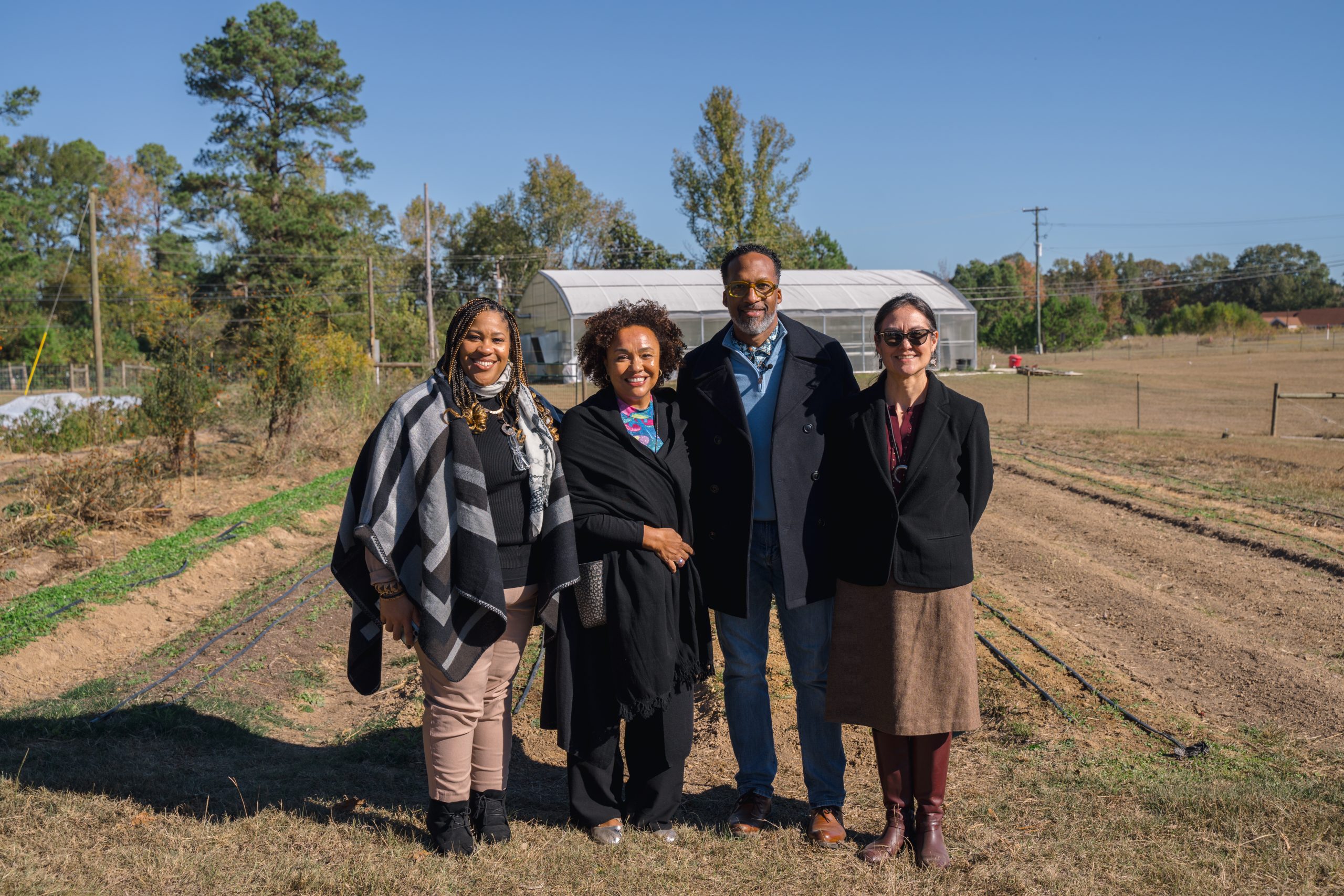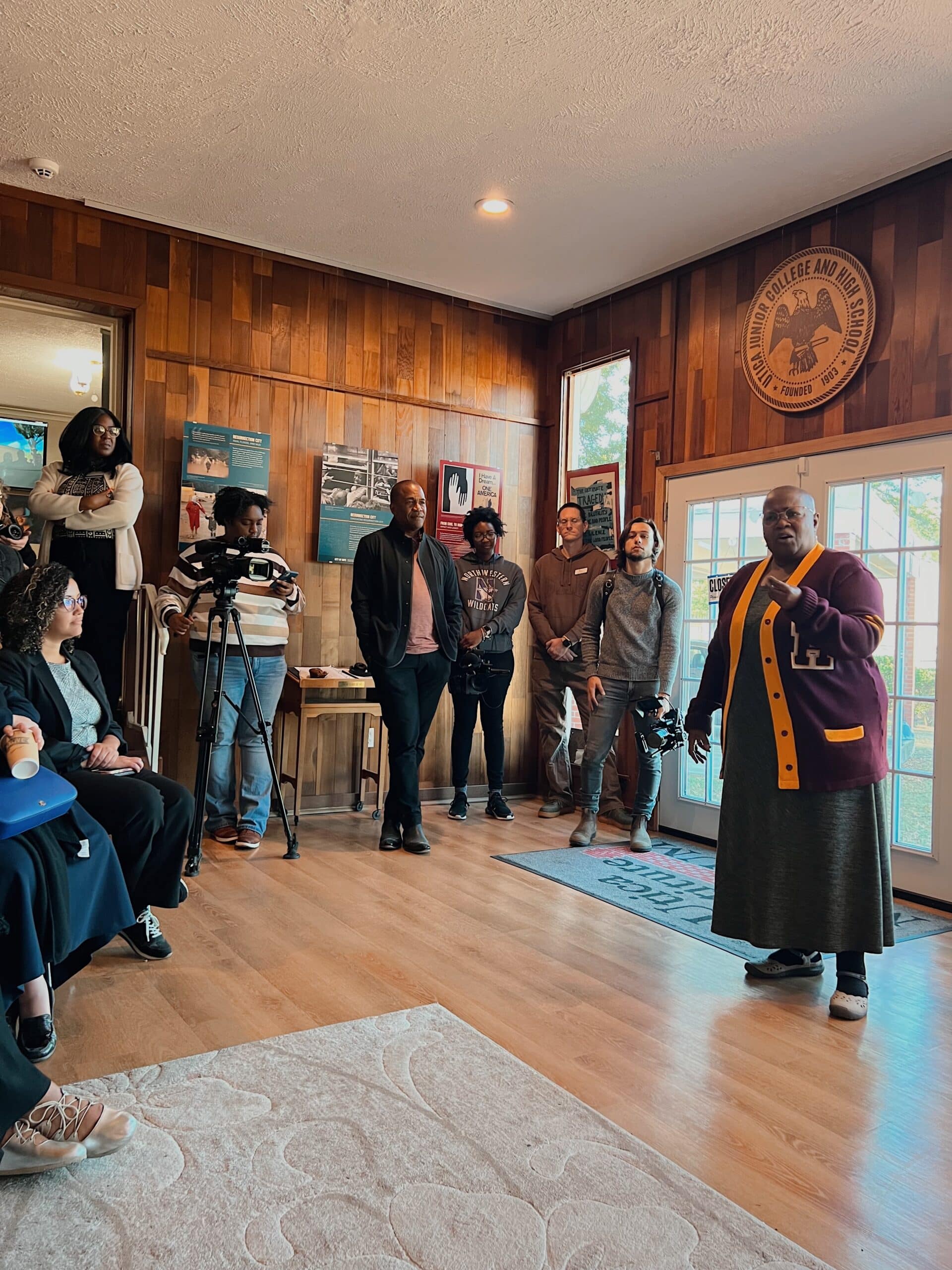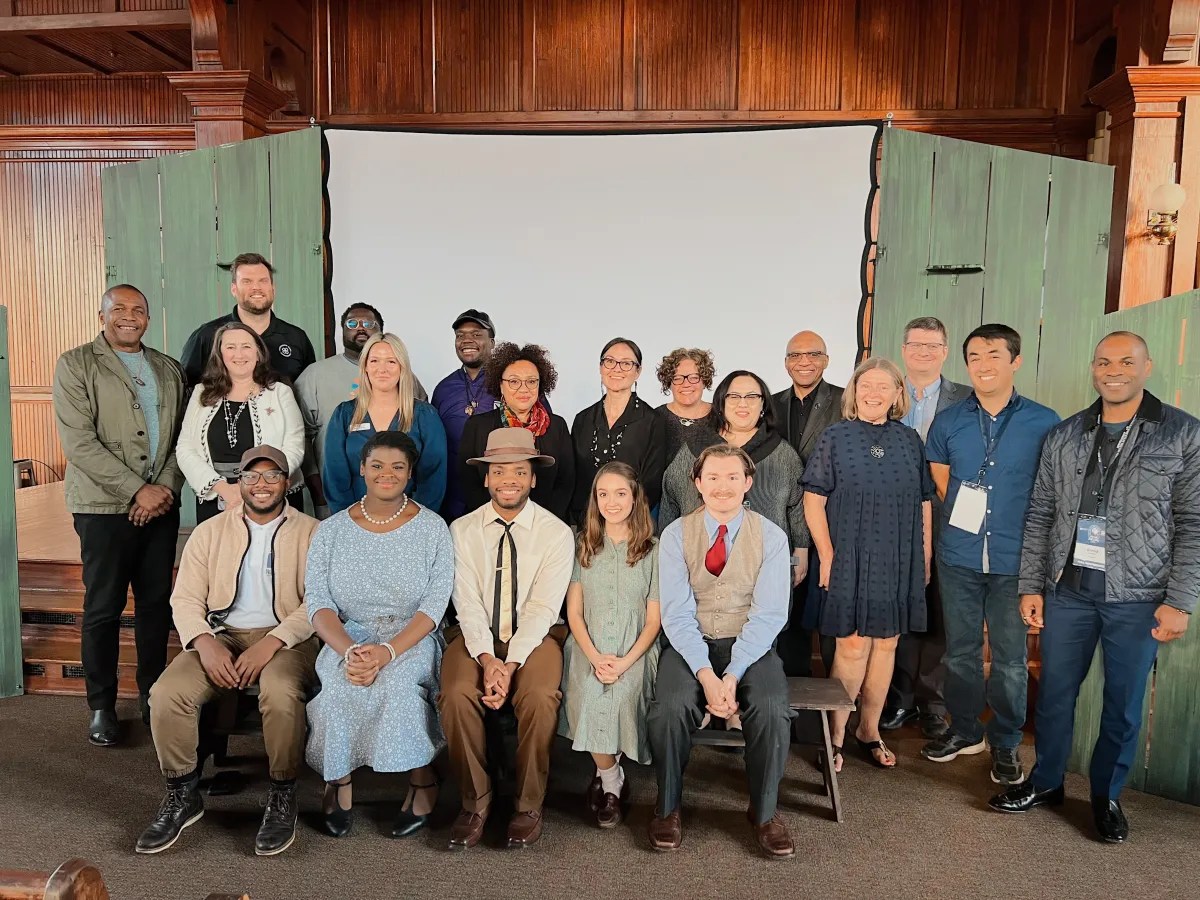Mississippi Today
Arts and humanities leaders visit Mississippi, come away with stories, ideas, affirmations

In a memory quilt by Hystercine Rankin at the Mississippi Museum of Art, National Endowment for the Arts Chair Maria Rosario Jackson found a touchstone for a phrase that echoed throughout her recent Jackson visit: “the opportunity to live an artful life.”
“It’s always available to us,” Jackson said, and not limited to designated places but alive in opportunities to make, teach and learn, and even in traditions handed down in families. “That quilting tradition, and how it shows up — from a living culture to something that is hung with so much pride on the walls of an esteemed cultural institution — there’s something in that, that demonstrates the breadth of what can encompass an artful life.
“If we have artful lives, and we’re able to see each other’s humanity, it’s such a pre-condition for all of the other things we say we want to do as a nation of opportunity and justice,” Jackson said.
Read: Ravi Lovett, healing quilter and art therapist
National Endowment for the Humanities Chair Shelly Lowe, a citizen of the Navajo Nation, found a welcome grounding at the Choctaw Chahta Immi Cultural Center in Philadelphia, the first site in her first visit to Mississippi. Conversations about the Choctaw dictionary project, and the importance of maintaining their language and cultural teachings, resonated. As did the commitment of smaller organizations she visited, such as the Smith Robertson Museum in Jackson, to confront and share histories that can sometimes be hard to face.
“This is what the humanities does,” Lowe said. “It helps us take this information, take difficult histories, and it allows us to pause and really think about those histories. To process that. The humanities, and I would argue the arts, give us the strength to move forward.”
Their recent visit, in company with leaders of other national and regional arts and culture groups, offered a firsthand look at work in Jackson and central Mississippi that fosters creative pursuits, cultural celebration, connection, conversations and community cohesion.
The 50th anniversary reconvening of the Phillis Wheatley Poetry Festival, Nov. 1-4, was the core attraction, with its roster of illustrious Black women writers, including Alice Walker and Sonia Sanchez, who were also part of the original conference Margaret Walker organized at Jackson State University in 1973.
The 2023 conference at JSU and the Jackson Convention Complex pulled in the next generation of prominent Black women writers, with Jesmyn Ward and Angie Thomas among a host of keynote participants. With intergenerational conversations a big draw, the festival tapped elder wisdom and contemporary voices and vigor, to inspire and energize listeners in the continued uplift of Black excellence, and as a force to reckon with injustice and trauma both past and now.
The convening amplified arts’ and humanities’ central role in daily life in Jackson and far beyond, said Phoebe Stein, president of the Federation of State Humanities Councils. “Not a luxury, but central to how we understand ourselves, and how we relate and live in community with others.”
Difficult histories — unpacked, discussed and shared to unite and strengthen — were as much a thread as celebration and support during leaders’ jam-packed itinerary. Both endowment chairs were part of the poetry festival’s closing panel, a tribute to Margaret Walker, and their twin presence in Jackson offered a prime chance for show-and-tell by Mississippi’s cultural leaders.
Mississippi Arts Commission’s David Lewis and Mississippi Humanities Council’s Stuart Rockoff built out “Chair-a-paloosa,” as they informally dubbed the gathering, with a robust schedule highlighting grantees in action.

In addition to the poetry festival, tours and stops took in Sipp Culture in Utica, the Utica Institute Museum, the Choctaw Chahta Immi Cultural Center in Philadelphia, and in Jackson, JSU, the Two Mississippi Museums, Smith Robertson Museum, Mississippi Museum of Art, Tougaloo College, the Asylum Hill Research Project and more. At Tougaloo’s historic Woodworth Chapel, they saw a preview of New Stage Theatre’s “Anne & Emmett’ Arts in Education production, a “meeting in memory” between Anne Frank and Emmett Till.
It’s rare to get that many national arts and humanities figures together, and rarer still to host them in such a small-town setting, noted Carlton Tucker, co-director of Sipp Culture, which harnesses food and story to reimagine their community and outfit it for the future. “For them to take an interest in a small, rural community and the work that we’re doing there, is remarkable, but it’s also remarkable for the state of Mississippi, because it just shows that there are a lot of things happening here that don’t necessarily show by the way that people think about the state from a national perspective.”
South Arts President and CEO Susie Surkamer praised the “incredible amount of really substantial work going on, and in all types of settings” in Mississippi, “and such high quality.” In much of it, the importance of involving the community also stood out. “That doesn’t always happen with every institution or organization, so that is wonderful to see.”
For the cadre of arts and humanities leaders, it was a chance to connect outside of a Zoom room or formal meetings, have cultural and historical experiences together “and really sit with the arc of American history and Mississippi’s place in that, and really consider the implications on our own work today,” said David Holland, co-chair of the Creative States Coalition and deputy director of WESTAF (Western States Arts Federation). “It really puts it into context … the significance of arts and culture to people’s lives, to healing, to understanding our history, to moving forward in a more just future together.”
“It is a treat for them and an opportunity for Mississippi to be a backdrop for larger conversations about our nation,” Lewis said. Plus, the showcase of daily arts-related work in both rural and metro settings in Mississippi can “really be a beacon … for the rest of the country.”
As well as the profile boost, it can bring benefits later on and inspire organizations to apply for funding, Rockoff said. “We hope, down the road, that it results in more grant funding coming to Mississippi.
“We’re a poor state. … In other states, there are plenty of other funders for these types of cultural activities. So, to have that support from the national endowments — that relatively small amount of money goes a long way here.”
There’s payoff, too, in the favorable impressions festival participants and visiting leaders pack up, take with them and spread back home.

On Lowe’s flight from Atlanta to Jackson last week, it was clear half the plane was bound for the Phillis Wheatley Poetry Festival, she said. “This festival brought in so many young African-American women — scholars, artists, poets, writers — who are all across the country, but they’re here in Mississippi,” sharing the impact of the people, the place and the program here.
“And, they’re all going to leave here, right? Talking about how they were here in Mississippi and how Mississippi is playing such a big part in their lives,” Lowe said. “Things like that are a very good way to say, ‘This is our history. This is the power of what we’ve done. This is where we’re going to continue to keep doing it.’”
This article first appeared on Mississippi Today and is republished here under a Creative Commons license.
Did you miss our previous article…
https://www.biloxinewsevents.com/?p=306413
Mississippi Today
On this day in 1947, Jackie Robinson broke MLB color barrier
April 15, 1947

Jackie Robinson broke through the color barrier in Major League Baseball, becoming the first Black player in the 20th century.
Born in Cairo, Georgia, Robinson lettered in four sports at UCLA – football, basketball, baseball and track. After time in the military, he played for the Kansas City Monarchs in the Negro Leagues. After his success there, Dodgers general manager Branch Rickey signed Robinson, and the legendary baseball player started for Montreal, where he integrated the International League.
In addition to his Hall of Fame career, he was active in the civil rights movement and became the first Black TV analyst in Major League Baseball and the first Black vice president of a major American corporation.
In recognition of his achievements, Robinson was posthumously awarded the Presidential Medal of Freedom and the Congressional Gold Medal.
Major League Baseball retired his number “42,” which became the title of the movie about his breakthrough.
Ken Burns’ four-hour documentary reveals that Robinson did more than just break the color barrier — he became a leader for equal rights for all Americans.
This article first appeared on Mississippi Today and is republished here under a Creative Commons Attribution-NoDerivatives 4.0 International License.![]()
Mississippi Today
Mississippians highlight Black Maternal Health Week
Advocates and health care leaders joined lawmakers Monday morning at the Capitol to recognize Black Maternal Health Week, which started Friday.
The group was highlighting the racial disparities that persist in the delivery room, with Black women three times more likely to die of a pregnancy-related cause than white women.
“The bond between a mother and her baby is worth protecting,” said Cassandra Welchlin, executive director of the Mississippi Black Women’s Roundtable.
Rep. Timaka James-Jones, D-Belzoni, spoke about her niece Harmony, who suffered from preeclampsia and died on the side of the road in 2021 along with her unborn baby, three miles from the closest hospital in Yazoo City.
“It’s utterly important that stories are shared – but realize these are not just stories. This is real life,” she said.
The tragedy inspired James-Jones to become a lawmaker. She says she is working on gaining support to appropriate the funds needed to build a standalone emergency room in Belzoni.
But it isn’t just emergency medical care that’s lacking for some mothers. Mental health conditions are a leading cause of pregnancy-related deaths, defined as deaths up to one year postpartum from associated causes.
And more than 80% of pregnancy-related deaths are deemed preventable – making the issue ripe for policy change, advocates said.
“About 20 years ago, I was almost a statistic,” said Lauren Jones, a mother who founded Mom.Me, a nonprofit seeking to normalize the struggles of motherhood through community support. “I contemplated taking my life, I severely suffered from postpartum depression … None of my physicians told me that the head is connected to the body while pregnant.”
With studies showing “mounting disparities” in women’s health across the United States – and Mississippi scoring among the worst overall – more action is needed to halt and reverse the inequities, those at the press conference said.
The Mississippi Legislature passed four bills related to maternal health between 2018 and 2023, according to a study by researchers at the University of Mississippi Medical Center.
“How many times are we going to have to come before committees like this to share the statistics before the statistics become a solution?” Jones asked.
A bill that would require health care providers to offer postpartum depression screenings to mothers is pending approval from the governor.
Rep. Zakiya Summers, D-Jackson, the organizer of the press conference, commended the Legislature for passing presumptive eligibility for pregnant women this year. The policy will allow women to receive health care covered by Medicaid as soon as they find out they are pregnant – even if their Medicaid application is still pending. It was spearheaded by Rep. Missy McGee, R-Hattiesburg.
Summers also thanked Rep. Kevin Felsher, R-Biloxi, for pushing paid parental leave for state employees through the finish line this year.
Speakers emphasized the importance of focusing Black Maternal Health Week not just on mitigating deaths but on celebrating one of life’s most vulnerable and meaningful events.
“Black Maternal Health Week is a celebration of life, since Black women don’t often get those opportunities to celebrate,” said Nakeitra Burse, executive director of Six Dimensions, a minority women-owned public health research agency. “We go into our labor and delivery and pregnancy with fear – of the unknown, fear of how we’ll be taken care of, and just overall uncertainty about the outcomes.”
This article first appeared on Mississippi Today and is republished here under a Creative Commons Attribution-NoDerivatives 4.0 International License.![]()
Mississippi Today
Trump to appoint two Northern District MS judges after Aycock takes senior status
President Donald Trump can now appoint two new judges to the federal bench in the Northern District of Mississippi.
U.S. District Judge Sharion Aycock announced recently that she was taking senior status effective April 15. This means she will still hear cases as a judge but will have a reduced caseload.
“I have been so fortunate during my entire legal career,” Aycock said in a statement. “As one of only a few women graduating in my law school class, I had the chance to break ground for the female practitioner.”
A native of Itawamba County, Aycock graduated from Tremont High School and Mississippi State University. She received her law degree from Mississippi College, where she graduated second in her class.
Throughout her legal career, she blazed many trails for women practicing law and female jurists. She began her career as a judge when she was elected as a Mississippi Circuit Court judge in northeast Mississippi in 2002, the first woman ever elected to that judicial district.
She held that position until President George W. Bush in 2007 appointed her to the federal bench. After the U.S. Senate unanimously confirmed her, she became the first woman confirmed to the federal judiciary in Mississippi.
This makes Aycock the second judge to take senior status in four years. U.S. District Judge Michael Mills announced in 2021 that he was taking senior status, but the U.S. Senate still has not confirmed someone to replace him.
President Joe Biden appointed state prosecutor Scott Colom to fill Mills’ vacancy in 2023. U.S. Sen. Roger Wicker approved Colom’s appointment, but U.S. Sen. Cindy Hyde-Smith blocked his confirmation through a practice known as “blue slips,” where senators can block the confirmation of judicial appointees in their home state.
This means President Trump will now have the opportunity to appoint two federal judges to lifetime appointments to the Northern District. U.S. District Judge Debra Brown will soon be the only active federal judge serving in the district. Aycock, Mills, and U.S. District Judge Glen Davidson will all be senior-status judges.
Federal district judges provide crucial work to the federal courts through presiding over major criminal and civil trials and applying rulings from the U.S. Supreme Court and the U.S. Court of Appeals in the local districts.
This article first appeared on Mississippi Today and is republished here under a Creative Commons Attribution-NoDerivatives 4.0 International License.![]()
-

 News from the South - Arkansas News Feed7 days ago
News from the South - Arkansas News Feed7 days agoArkansas State Police launches new phone-free campaign
-

 News from the South - Arkansas News Feed5 days ago
News from the South - Arkansas News Feed5 days agoMeasles cases confirmed in Arkansas children after travel exposure
-

 News from the South - North Carolina News Feed6 days ago
News from the South - North Carolina News Feed6 days agoTax Day of April 15 is essentially May 1 in North Carolina | North Carolina
-

 News from the South - Missouri News Feed6 days ago
News from the South - Missouri News Feed6 days agoSleeping 14-year-old critically injured by bullet in Ferguson home; father flees scene
-

 News from the South - Texas News Feed7 days ago
News from the South - Texas News Feed7 days agoKSAT's Patty Santos speaks with Poteet Strawberry Festival court members, organization VP
-

 News from the South - Alabama News Feed5 days ago
News from the South - Alabama News Feed5 days agoImpacts of Overdraft Fees | April 11, 2025 | News 19 at 10 p.m.
-

 Mississippi Today6 days ago
Mississippi Today6 days agoProgram helps students with disabilities forge paths to careers
-

 Mississippi Today6 days ago
Mississippi Today6 days agoA self-proclaimed ‘loose electron’ journeys through Jackson’s political class



















































